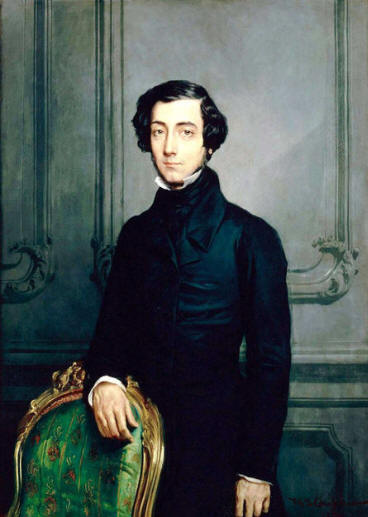
Alexis De Tocqueville
In Democracy in America, published in 1835, Tocqueville wrote of the New World and its burgeoning democratic order. Observing from the perspective of a detached social scientist, Tocqueville wrote of his travels through America in the early 19th Century when the market revolution, Western expansion and Jacksonian democracy were radically transforming the fabric of American life. He saw democracy as an equation that balanced liberty and equality, concern for the individual as well as the community. Tocqueville's impressions of American religion and its relationship to the broader national culture are likewise notable:
"Moreover, almost all the sects of the United States are comprised within the great unity of Christianity, and Christian morality is everywhere the same. In the United States the sovereign authority is religious, and consequently hypocrisy must be common; but there is no country in the whole world in which the Christian religion retains a greater influence over the souls of men than in America, and there can be no greater proof of its utility, and of its conformity to human nature, than that its influence is most powerfully felt over the most enlightened and free nation of the earth.
The Americans combine the notions of Christianity and of liberty so intimately in their minds, that it is impossible to make them conceive the one without the other; and with them this conviction does not spring from that barren traditionary faith which seems to vegetate in the soul rather than to live.
There are certain populations in Europe whose unbelief is only equaled by their ignorance and their debasement, while in America one of the freest and most enlightened nations in the world fulfills all the outward duties of religion with fervor.
Upon my arrival in the United States, the religious aspect of the country was the first thing that struck my attention; and the longer I stayed there, the more did I perceive the great political consequences resulting from this state of things, to which I was unaccustomed. In France I had almost always seen the spirit of religion and the spirit of freedom pursuing courses diametrically opposed to each other; but in America I found that they were intimately united, and that they reigned in common over the same country."
Alexis de Tocqueville, Democracy in America, (New York: A. S. Barnes & Co., 1851), pp. 331, 332, 335, 336-7, 337, respectively.
US Courts Gov. Info
In God We Trust
En Dieu Nous Avons Confiance
Pour la liberté de parole afin d'exposer la corruption en politique et en droit, the people shall speak
For Liberty of Speech to Expose Corruption in Politics and Law
Droit Ne Poet Pas Morier
Right Does Not Die

Alexis De Tocqueville
1805-1859
"A democracy cannot exist as a permanent form of government. It can only exist until the voters discover that they can vote themselves largesse from the public treasury. From that moment on, the majority always votes for the candidates promising the most benefits from the public treasury with the result that a democracy always collapses over loose fiscal policy, always followed by a dictatorship. The average age of the world's greatest civilizations has been 200 years."